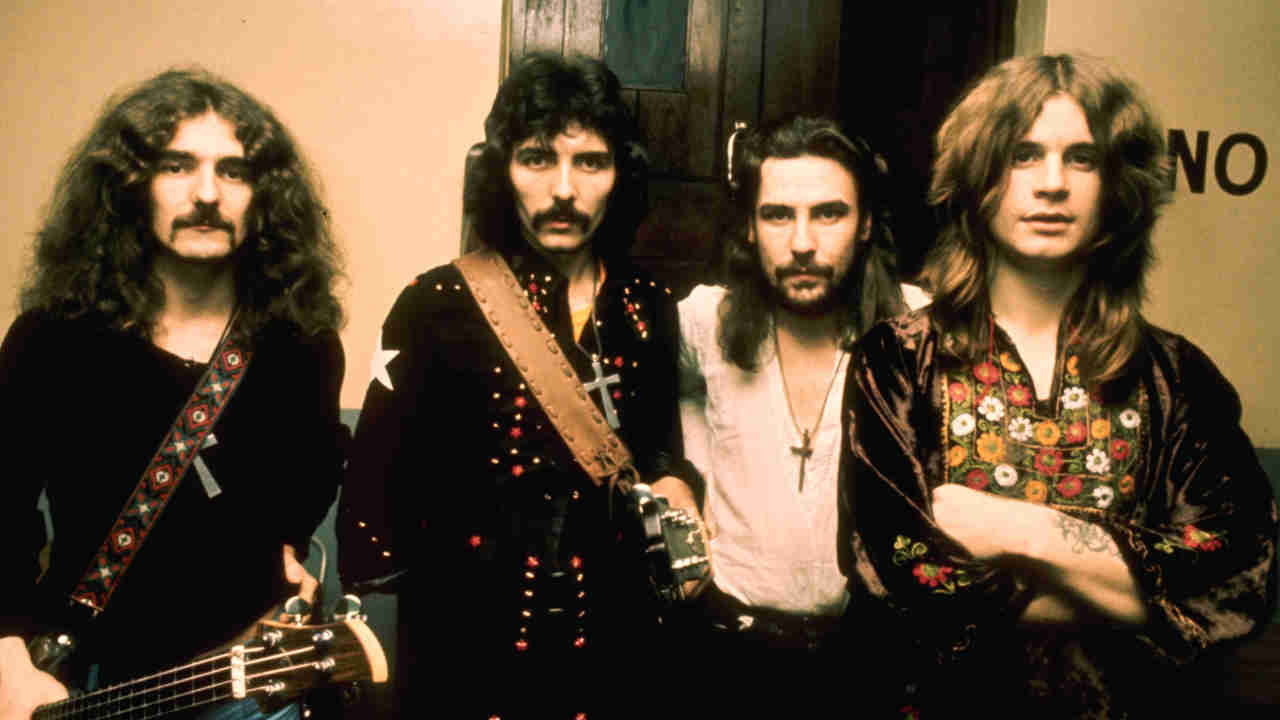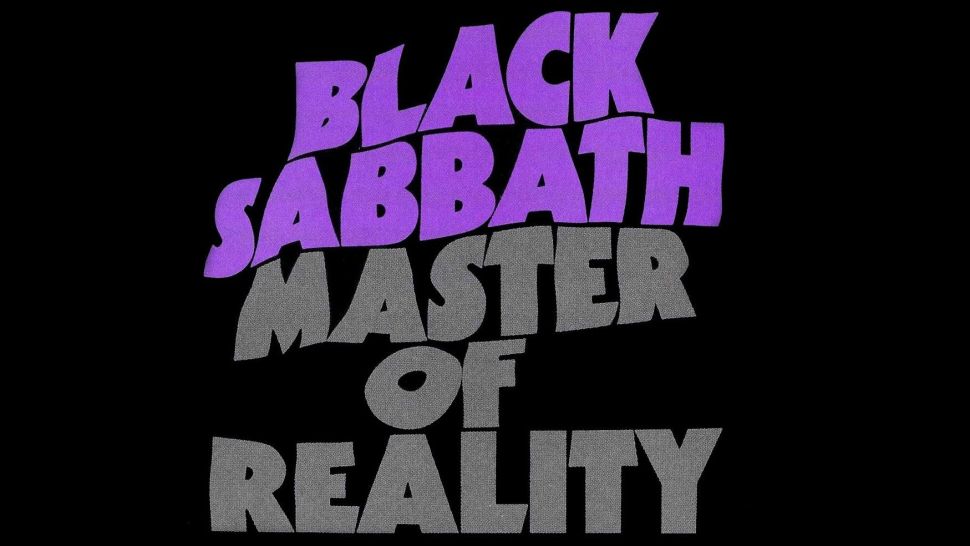It was the dawn of ’71, and Black Sabbath were bulletproof. During their first ferocious year as a recording band, the lineup of Ozzy Osbourne, Tony Iommi, Geezer Butler and Bill Ward had swung a wrecking ball through rock’s world order, forging the metal genre with 1970’s brutal double bill of Black Sabbath and Paranoid, exposing the 60s gods as hairless pipsqueaks, and deflecting the barbs of a bemused music press like peashooters against a panzer tank.
“We had proved against all odds that we were a viable band, much to the annoyance of our critics,” bassist Geezer Butler reflects, a half-century later. “We were full of confidence with our first two releases [which ultimately went gold and platinum], our tours were selling out everywhere, so we knew our instincts were right about our music. It felt like we were an unstoppable juggernaut.”
In February ’71, the sea change was evident as the band and long-standing producer Rodger Bain rolled into Notting Hill’s Island Studios for third album, Master Of Reality. As no-mark provincial longhairs, Sabbath’s first two LPs had been rushed affairs, their paymasters at the Vertigo label tapping the wristwatch. Now, as galacticos, the band’s carte blanche ran from sprawling studio time to 24-track technology, inviting them to test the boundaries.

“We were excited to see where our writing would take us,” remembers Geezer. “It was quite an adventure in itself. We wanted the heavier songs to be heavier than anything we’d done before. Master Of Reality established the band as the purveyors of the heaviest music up to that point, and said, ‘Go ahead, beat that.’”
Appalled by the “screaming kids” who hoovered up 1970’s Paranoid single, Black Sabbath had sworn off penning anything too hooky. But during this imperious phase, the lineup couldn’t help but spit out shadowy anthems where stadium hooks met jet-black lyrics. “Sabbath was all about the dark reality of life,” explains the bassist. “We’d grown up in the aftermath of World War Two, and Aston, where we were from, still had bombed-out buildings and neighbours with war wounds. At the time of Master Of Reality, Vietnam was raging, the Cold War was at its coldest, the Troubles in Northern Ireland were close to home. A few others were singing about the underside of life, but we had the heaviness to hammer the subjects home.”
While the jackhammer After Forever found Geezer exploring organised religion with a candour no previous rock lyricist had dared (‘Would you like to see the Pope on the end of a rope?’), another socially charged fan favourite taking shape at Island was Children Of The Grave, on which the bassist’s anti-conflict manifesto ran with the Paranoid album’s War Pigs. With Ozzy Osbourne’s yowl articulating the fears of a generation bound for a wooden box (‘Must the world live in the shadow of atomic fear? / Can they win the fight for peace or will they disappear?’), the song’s malevolent punch came from Tony Iommi’s pivotal move to downtune his Gibson SG by three semitones, to C#.
Practically, this was to ease the pain of fretting with fingers that had been lacerated in an industrial accident before Sabbath broke through. But with Geezer matching the drop on bass, a defining side-effect was to thicken the band’s fathoms-deep sound for a riff that galloped like apocalyptic stallions.
“I love the rhythm of Children Of The Grave,” notes Geezer. “It was unique at the time, a menacing, marching vibe. The downtuning definitely summoned the advent of doom metal and heaviness in general. Too many bands to mention have told me they were inspired by it.”
Recorded at the same bowel-churning pitch, Lord Of This World was a rolling boulder of a song, while Into The Void’s telepathic proto-sludge groove belied the challenges of catching it in the bottle, with drummer Bill Ward struggling to ride the shifting time signatures and Tony writing in his memoirs that Ozzy tripped on the flows of warped poetry.
“He had to sing really rapidly: ‘Rocket engines burning fuel so fast / Up into the night sky they blast’, quick words like that. Geezer had written the words out for him. Seeing him try was hilarious.”
But heaviosity wasn’t the only currency on Master Of Reality. Opening like a flourish from a medieval banquet, Orchid was a wistful acoustic tumble that clocked just 90 seconds. Shorter still, Embryo was an Eastern-sounding thumbnail sketch that can’t have thrilled label execs. More substance came from the slow-burn Solitude, where the hypnotic cycle of Tony’s lick waltzed with haunting flute, and Ozzy sang with a grace that countered his berserker reputation.
“The mellow tracks make the heavy tracks sound even heavier,” reasons Geezer. “Plus, if you’re stoned while listening, or if you’re on acid, things can get intense, so it’s nice to come down before the onslaught. Hearing Solitude now, it has a sort of moody blues feel, especially with Tony’s flute playing. It shows how good Ozzy’s more melodic vocals are, too.”
No band was better qualified to write the soundtrack for smoking sessions. Geezer recalls that “we never got totally blasted while recording songs – listening back was when the real spliffing began”. But stroll through Island in ’71 and you only had to follow your nose to find Sabbath at work, the band’s lifestyle summed up by the hacking cough that opens Master’s thundering stoner anthem, Sweet Leaf.
“That’s me,” recalled Tony. “Ozzy rolled this big joint… I had a couple of puffs and nearly choked myself. They left the tape running and it turned into the ideal start for Sweet Leaf.”
“We used to smoke pounds of the shit, man,” Ozzy told High Times. “We used to buy it by the fuckin’ sackful. We used to be so fucked-up all the time. Wake up in the morning, start the day with a spliff, go to bed with it…”

At last, in July 1971, Sabbath emerged from this heady fug of weed and ambition with the third album that changed their trajectory. On paper, Master Of Reality wasn’t much: just six ‘proper’ songs and a 34-minute run time. Nor did it appease the rock press, with Rolling Stone’s enfant terrible Lester Bangs sniping at the “thick, plodding, almost arrhythmic steel wool curtains of sound”. Geezer shrugs: “Before Sabbath, I saw Rolling Stone’s review of Zeppelin’s first album, which I loved and they trashed. I realised how out of touch and worthless critics could be. So when they trashed Sabbath, it was like a badge of honour.”
To grassroots rock fans, however, Master Of Reality’s earth-shaking impact spread ripples through the ages, hitting the UK at No.5 and a breakthrough US No.8 on its march to two million sales, and catching the ear of rock’s next generation. And while the music dared their peers to compete, the lineup also raised the bar for excess. On previous US tours, there had been surgically enhanced women of easy virtue (“My first experience of silicone tits,” recalled Ozzy) and snowy mountains of celebrity-grade cocaine (“We used to have a guy travel round with a suitcase full of kilos of that shit”). Now, in the summer of ’71, an epic US tour raised the stakes, the band stepping aboard a private jet where “you literally couldn’t move for booze”, according to Rick Wakeman of support act, Yes.
“It was like four kids let loose in Toys R Us,” recalls Geezer of the ensuing carnage. “As to be expected of four blokes in their early 20s, we went a bit wild. Booze, women, drugs, nice hotels, private planes – all of it paid for by what we loved doing. But as with everything, too much of a good thing has its downside.”
Released from the studio’s microcosm, Master Of Reality’s sticky aftermath exposed the hairline cracks that would eventually shatter the classic lineup. Bill has cited the band’s intake of “uppers, downers, Quaaludes, whatever you want”, and the drummer told Classic Rock of the moment those triumphant days turned sour. “It was after Master Of Reality that I remember Geezer broaching the issue for the first time of how out of control everything had become. He started saying he was getting tired…”
“The secret is moderation,” says Geezer. “Once that becomes addiction, the shine slowly wears off and you start to question the whole meaning of everything. With such a gruelling schedule, we were taking more and more substances to keep us going, instead of taking time out to breathe. We wore ourselves out in the end, and the dream became nightmarish at times.”
No band could maintain such appetites. Remarkably, Sabbath’s hot streak lasted until 1973’s Sabbath Bloody Sabbath (“It was downhill all the way after that,” says Ozzy). But a half-century later, Master Of Reality marks the final time that metal’s founding fathers functioned as a fist-tight unit.
“Master Of Reality is where we found ourselves,” Bill told music journalist and Hammer legend Malcolm Dome. “I know people feel that Sabbath invented heavy metal with our debut album – and that is true to some extent. But I believe that it’s with Master Of Reality that we proved the potential and power of the music.”
Additional quotes: Mick Wall. Published in Metal Hammer #348

